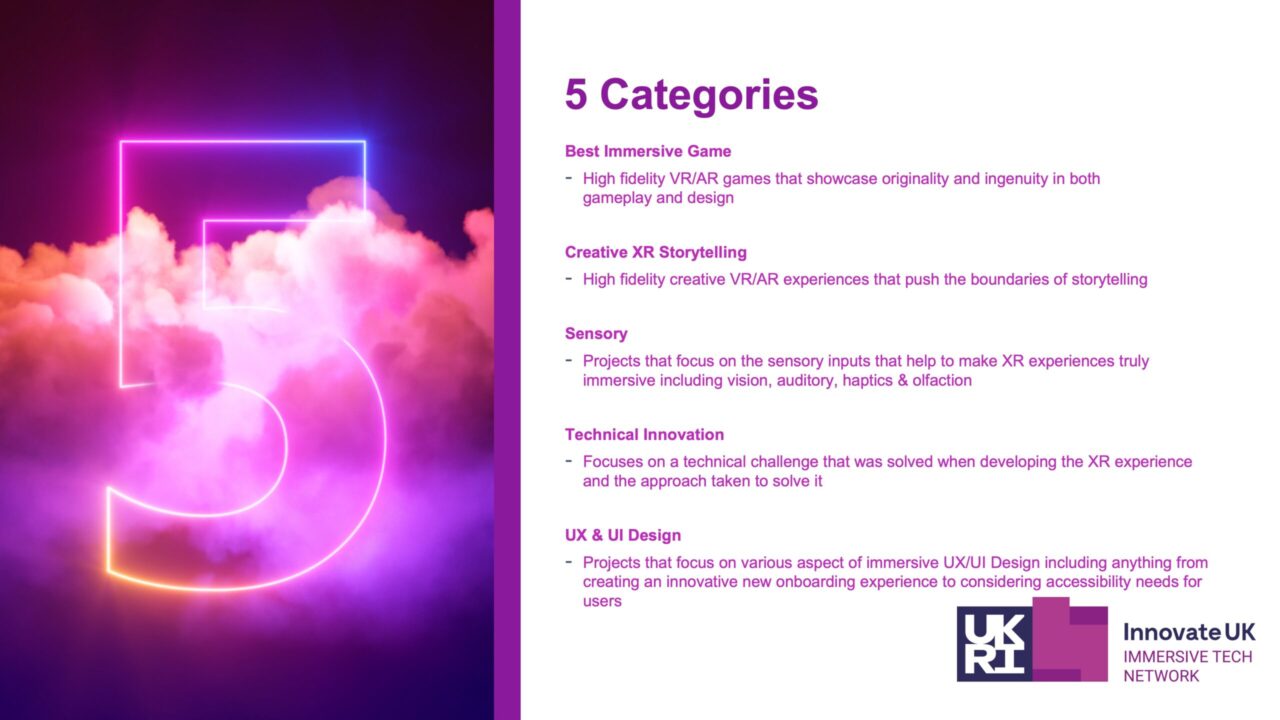The Innovate UK Immersive Tech Awards 2025 categories are:
- Best Immersive Game
- Creative XR Storytelling
- Sensory
- Technical Innovation
- UX & UI Design
These 5 categories are for undergraduate and postgraduate students aged 18+, studying in the UK. Judges reserve the right to move an application to a different category if they feel it is better suited to a different category.
Anyone else aged 18+ may be eligible for the Career Breakout Showcase (you must be UK-based).
All entries will be judged on:
- Creativity (including Originality and Aesthetic)
- Execution
- Functionality
- Potential (including Innovative Approach)
The deadline for entry was 16 March 2025, finalists were announced in April, and winners were celebrated at the awards reception on 2 June in London.
Check out the Immersive Tech Awards 2024 Finalists’ projects and the 2023 awards winners.
Best Immersive Game
This category is about virtual and augmented reality gaming demonstrating exceptional creativity and innovation. Submissions should showcase originality and ingenuity in both gameplay and design. Judges will evaluate a range of factors, including the innovative features, quality of graphics, and immersive audio that make the game stand out. The winning game should provide a user experience that is both enjoyable and accessible, engaging players with exciting and interactive gameplay that keeps them coming back. Submissions should highlight originality and demonstrate a clear understanding of what makes virtual reality gaming so unique and special. The game does not have to be fully completed to be submitted.
Examples in this category can include:
- Originality (Control, User Movement and Motion Comfort)
- Innovative Features
- Use and Quality of Graphics
- Use and Quality of Audio
- User Enjoyability
- Game Originality
Creative XR Storytelling
This category is about outstanding XR content that masters storytelling through immersive and creative methods. This category is for projects that effectively engage audiences, using XR technology to deliver narratives and interactive experiences in a way that leaves a lasting impression, such as exploring how interactivity can be used to increase immersion within a story. This may include research into developing new, disruptive ways of creating, thinking and responding to story or different approaches to XR storytelling and how the immersive format influences the approach to interweaving story and interactivity.
Examples in this category can include:
- Experiences that combine XR with interactive elements, allowing users to engage with the narrative actively
- Projects that explore new storytelling formats and narrative structures using XR technologies
- Films that utilize XR technologies to tell compelling, immersive stories
- XR content that explores and raises awareness on important social and global issues
- Showcasing diverse cultural stories and experiences through XR
- Narrative that is both visually incredible and communicates an idea or concept in an impactful way
- High visual fidelity experiences that push the immersive medium into new territory such as the level of reality, detail or visual enrichment
Sensory
This category focuses on the sensory inputs that help to make VR, AR or MR experiences truly immersive including vision, auditory, haptics, olfaction, and hand tracking. This may include input/output hardware and interaction software associated with haptics, gesture, eye-tracking, controllers, sensors, cameras, display, audio, connectivity, hand tracking, gaze, motion control, voice, bio-sensing, emotion and EEG solutions.
Examples in this category can include:
- Immersive experiences that bring together sensory stimulations across touch, smell, visual, acoustics, wind, vibration, head
- Applied use of eye tracking for human centric design, simulation and analysis
- Applied use of machine learning from a human centric immersive experience
- Excellence in the combination of a physical and digital immersive experience
- Immersive experiences that can be a catalyst of change to how we simulate, analyse and design the built and natural environment
Technical Innovation
This category is focused on the outcome produced by innovation and/or problem solving enabled by code. The focus should be on what technical challenge was solved when developing the immersive experience (either VR, AR or MR), and the approach that the applicant took to solve it.
Similar to the other categories, it’s not always about the most complex or the most high-tech solution – simple but effective solutions are also welcome.
In addition to providing the code itself, applicants will also need to demonstrate the flow and outcome of the application of the code.
Examples in this category can include, but are not limited to:
- Automation and reusable code enabling exceptional quality of experience
- Technical ways of creating shared experiences
- Applied integration of multiple emerging technologies
- Applied use of visual shader, particle and voxel systems in meeting new use cases with the interpretation of data, live or static
- Innovation in immersive use of large data sets
- Creating systems of methodologies or creativity in putting systems together
- Repurposing and learning from different industries to apply innovative problem solving to a different sector
UX & UI Design
This category is focused on UX & UI design for immersive experiences, which can include VR, AR or MR. Immersive experiences should be enjoyable, intuitive, and low friction. They should feel seamless and easy to use. Submissions for this category can address any aspect of immersive UX & UI. This could include anything from creating an innovative new onboarding experience, to considering accessibility needs for users.
Examples in this category can include:
- Accessible and incredible experiences
- Innovation to create high quality experiences for large scale audiences
- Novel UI interfaces that engage and delight
- Innovative ways to customise experiences
- Applied innovative use of immersive user experience solving today’s user needs
- UX innovation in knowledge dissemination for training
- Inclusive and accessible immersive environments covering physical disability and neurodiversity
- Immersive experiential that enable new ways to collaborate and design
